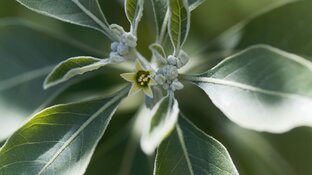Ashwagandha
Ashwagandha, also known as the "Queen of Ayurveda" and sleeping berry, is a traditional plant that helps you fall asleep, supports you during stress and increases your resistance to stressors.



Ashwagandha sleep berry
Coming from the nightshade family, ashwagandha has numerous convincing functions for the body. Thus, the sleeping berry is used especially for stress and to support vitality. Its popularity is also growing in modern times. The origins and health potential of ashwagandha are explained in more detail here.
What is Ashwagandha?
Sleep berry, Indian ginseng, winter cherry: Ashwagandha (Withania somnifera) is a “child of many names”. Originating in Africa and Asia, this “Queen of Ayurveda” spread from these regions to other countries and is now also found in southern Europe, in the Canaries, and Cape Verde. The plant loves sandy to gravel soils and reaches a height of up to 160 cm under good local conditions. This herbaceous nightshade (solanum) is characterized by egg-shaped to elongated leaves of mint green to olive green. The undersides of the leaf are covered in fine hair. In its flowering period between July and September, the plant forms relatively inconspicuous bell-shaped flowers, which turn into strikingly bright red berries.
What ingredients are in Ashwagandha?
Although Ashwagandha is also known by the name of the fruit – winter cherry, poison gooseberry – it is not the fruit that is used for health. Although the fruits are undoubtedly seductive, as they are even reminiscent of physalis, they are considered inedible due to their high alkaloid content. Instead, it is actually in the thick whitish to slightly brownish root below the ground with its interesting mix of secondary plant substances that the health benefits can be found. Modern science is particularly interested in the naturally occurring withanolides with the main substances withanolide A, withaferin A, and withanolide D that the plant contains. In addition, the plant supplies other secondary ingredients such as saponins, tannins, and flavonoids as well as abundant iron.
Ashwagandha effect: What is Ashwagandha good for?
Someone who sees fairy-tale Indian genre images in Ashwagandha and its nickname “The Queen of Ayurveda” will be surprised by the original meaning of the word. In ancient Sanskrit, Ashwagandha means “odor of a horse” – a name that probably comes from the characteristic fragrance of the plant. Some people who are knowledgeable about Ayurveda see it as an indication that the plant "can wake up our inner stallion". But that is not the only health benefit that Ashwagandha has to offer.
Scientifically documented indications of Ashwagandha
Ashwagandha as protection against restlessness and stress
Ashwagandha has been used in Ayurveda for thousands of years to support vitality and well-being as well as to strengthen our life forces and maintain mental health. As a plant-based adaptogen, it promotes our adaptive capacity, strengthens stress resistance, and helps stress sufferers to find inner peace. Human studies have also confirmed that Ashwagandha delivers what it promises.
Ashwagandha or sleep berry – because the name says it all
Sleep disorders are a pronounced phenomenon in our modern times. But, as so often in life, traditional answers can be found to modern problems. The common name sleep berry and the Latin name somnifera (soporific) are more than just a clue to the fact that Ashwagandha helps you to sleep. The calming effect is probably due to the influence of Ashwagandha on the GABA system.
Ashwagandha as an immunological tool
Times have changed and a powerful immune system has become far more the focus of interest. Ashwagandha provides backup to our body’s immune system; this was the result of a current randomized, placebo-controlled double-blind study in which the 30-day intake of 60 mg Ashwagandha extract improved the immune profile of healthy adults.
Scientific news: Did you know that Ashwagandha can reduce stress-related insomnia by 70%?
This was concluded by a clinical study for which long-term stressed patients took 300 mg Ashwagandha extract twice daily for eight weeks. Its relaxing and calming effect makes Ashwagandha an ideal "relaxant" – especially for people who are kept awake by stress.
Other traditional areas of application for this natural extract according to early scientific indications:
Support of testosterone synthesis and male fertility
Nutritive contribution to brain performance, attention span and short and long-term memory
Neuroprotection
Supports muscle strength, regeneration and endurance
Contribution to a healthy blood sugar level
Concomitant aid in the case of (especially stress-related) obesity
Ashwagandha: What precautions are necessary?
Pregnant mothers and breastfeeding women should consult their doctor before taking Ashwagandha root. People who use thyroid medicines or take sedatives should also consult their doctor before taking Ashwagandha.
The best time: When should Ashwagandha be taken?
Correct timing is required so that Ashwagandha can fully develop its desired effect. To enjoy the stress-relieving effect of the sleep berry, Ashwagandha should ideally be taken before a meal. If you find it difficult to sleep at night and want to use Ashwagandha as a kind of “sleeping aid”, you should take it before going to bed.
How long should Ashwagandha be taken?
All good things take time. Like many natural substances, Ashwagandha also takes a few days to a few weeks before its benefits become noticeable.
Where can I get Ashwagandha?
If you are looking for premium-quality Ashwagandha, you will find it at Biogena. The Ashwagandha Formula contains not only high-quality Withania somniferaroot extract with standardized withanolide content but also combines it
with magnesium and vitamin B6 as a supportive backup combination. This makes it easy to take a short nutritional break and to find your inner balance again.
Literature on request from the author.





